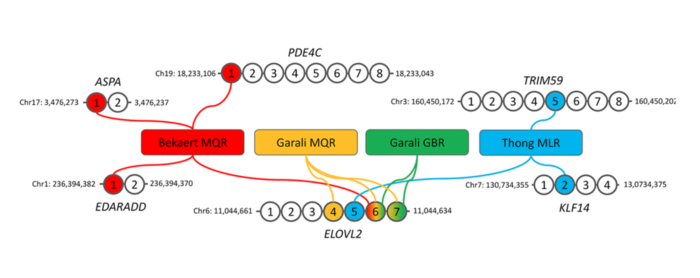BUFFALO, NY- October 17, 2022 – A new research paper was published on the cover of Aging (listed as “Aging (Albany NY)” by Medline/PubMed and “Aging-US” by Web of Science) Volume 14, Issue 19, entitled, “Centenarians consistently present a younger epigenetic age than their chronological age with four epigenetic clocks based on a small number of CpG sites.”

Credit: © 2022 Daunay et al.
BUFFALO, NY- October 17, 2022 – A new research paper was published on the cover of Aging (listed as “Aging (Albany NY)” by Medline/PubMed and “Aging-US” by Web of Science) Volume 14, Issue 19, entitled, “Centenarians consistently present a younger epigenetic age than their chronological age with four epigenetic clocks based on a small number of CpG sites.”
Aging is a progressive time-dependent biological process affecting differentially individuals, who can sometimes present exceptional longevity. Epigenetic alterations are one of the hallmarks of aging, which comprise the epigenetic drift and clock at DNA methylation level.
In a new study, researchers Antoine Daunay, Lise M. Hardy, Yosra Bouyacoub, Mourad Sahbatou, Mathilde Touvier, Hélène Blanché, Jean-François Deleuze, and Alexandre How-Kit from Foundation Jean Dausset – CEPH, Laboratory of Excellence GenMed, Sorbonne Paris Nord University, University of Paris (CRESS), and Institut François Jacob investigated the DNA methylation-based age (DNAmage) of long-lived French individuals in the CEPH Aging Cohort using four epigenetic clocks.
“In the present study, we estimated the DNA methylation-based age (DNAmage) using four epigenetic clocks based on a small number of CpGs in French centenarians and semi-supercentenarians (CSSC, n=214) as well as nonagenarians’ and centenarians’ offspring (NCO, n=143) compared to individuals from the French general population (CG, n=149).”
DNA methylation analysis of the nine CpGs included in the epigenetic clocks showed high correlation with chronological age (-0.66>R>0.54) and also the presence of an epigenetic drift for four CpGs that was only visible in CSSC. DNAmage analysis showed that CSSC and to a lesser extend NCO present a younger DNAmage than their chronological age (15-28.5 years for CSSC, 4.4-11.5 years for NCO and 4.2-8.2 years for CG), which were strongly significant in CSSC compared to CG (p-values<2.2e-16).
These differences suggest that epigenetic aging and potentially biological aging are slowed in exceptionally long-lived individuals and that epigenetic clocks based on a small number of CpGs are sufficient to reveal alterations of the global epigenetic clock.
“This suggests a decelerated epigenetic and biological aging in these two groups of individuals, confirming the results of three other studies performed on Italian, Australian and Israeli long-lived individuals. In addition, our study also demonstrated the possibility of using epigenetic clocks based on a small number of CpG sites to reveal DNAmage and chronological age differences between individuals with different life expectancy.”\
DOI: https://doi.org/10.18632/aging.204316
Corresponding Author: Alexandre How-Kit – Email: [email protected]
Keywords: epigenetic clock, DNAmage, centenarians, DNA methylation, pyrosequencing, longevity
Sign up for free Altmetric alerts about this article: https://aging.altmetric.com/details/email_updates?id=10.18632%2Faging.204316
About Aging-US:
Launched in 2009, Aging (Aging-US) publishes papers of general interest and biological significance in all fields of aging research and age-related diseases, including cancer—and now, with a special focus on COVID-19 vulnerability as an age-dependent syndrome. Topics in Aging go beyond traditional gerontology, including, but not limited to, cellular and molecular biology, human age-related diseases, pathology in model organisms, signal transduction pathways (e.g., p53, sirtuins, and PI-3K/AKT/mTOR, among others), and approaches to modulating these signaling pathways.
Please visit our website at www.Aging-US.com and connect with us:
- SoundCloud – https://soundcloud.com/Aging-Us
- Facebook – https://www.facebook.com/AgingUS/
- Twitter – https://twitter.com/AgingJrnl
- Instagram – https://www.instagram.com/agingjrnl/
- YouTube – https://www.youtube.com/agingus
- LinkedIn – https://www.linkedin.com/company/aging/
- Reddit – https://www.reddit.com/user/AgingUS
- Pinterest – https://www.pinterest.com/AgingUS/
For media inquiries, please contact [email protected].
Aging (Aging-US) Journal Office
6666 E. Quaker Str., Suite 1B
Orchard Park, NY 14127
Phone: 1-800-922-0957, option 1
###
Journal
Aging-US
DOI
10.18632/aging.204316
Method of Research
Data/statistical analysis
Subject of Research
People
Article Title
Centenarians consistently present a younger epigenetic age than their chronological age with four epigenetic clocks based on a small number of CpG sites
Article Publication Date
3-Oct-2022




